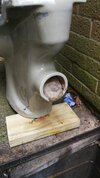Spirit of salts is fun stuff - you can buy it in hardware shops, it's strong acid, it eats lime, it might eat any cement further down the system if you're not careful, the fumes are scary.
I'd be tempted to:
-put on some thick gloves
-open the window or put on extractor fan
-put in some spirit of salts, maybe 1:5 with water (don't drip it anywhere else)
-run away, close the door, don't let anyone in there for an hour or two
...but I'm no professional
I'd be tempted to:
-put on some thick gloves
-open the window or put on extractor fan
-put in some spirit of salts, maybe 1:5 with water (don't drip it anywhere else)
-run away, close the door, don't let anyone in there for an hour or two
...but I'm no professional


